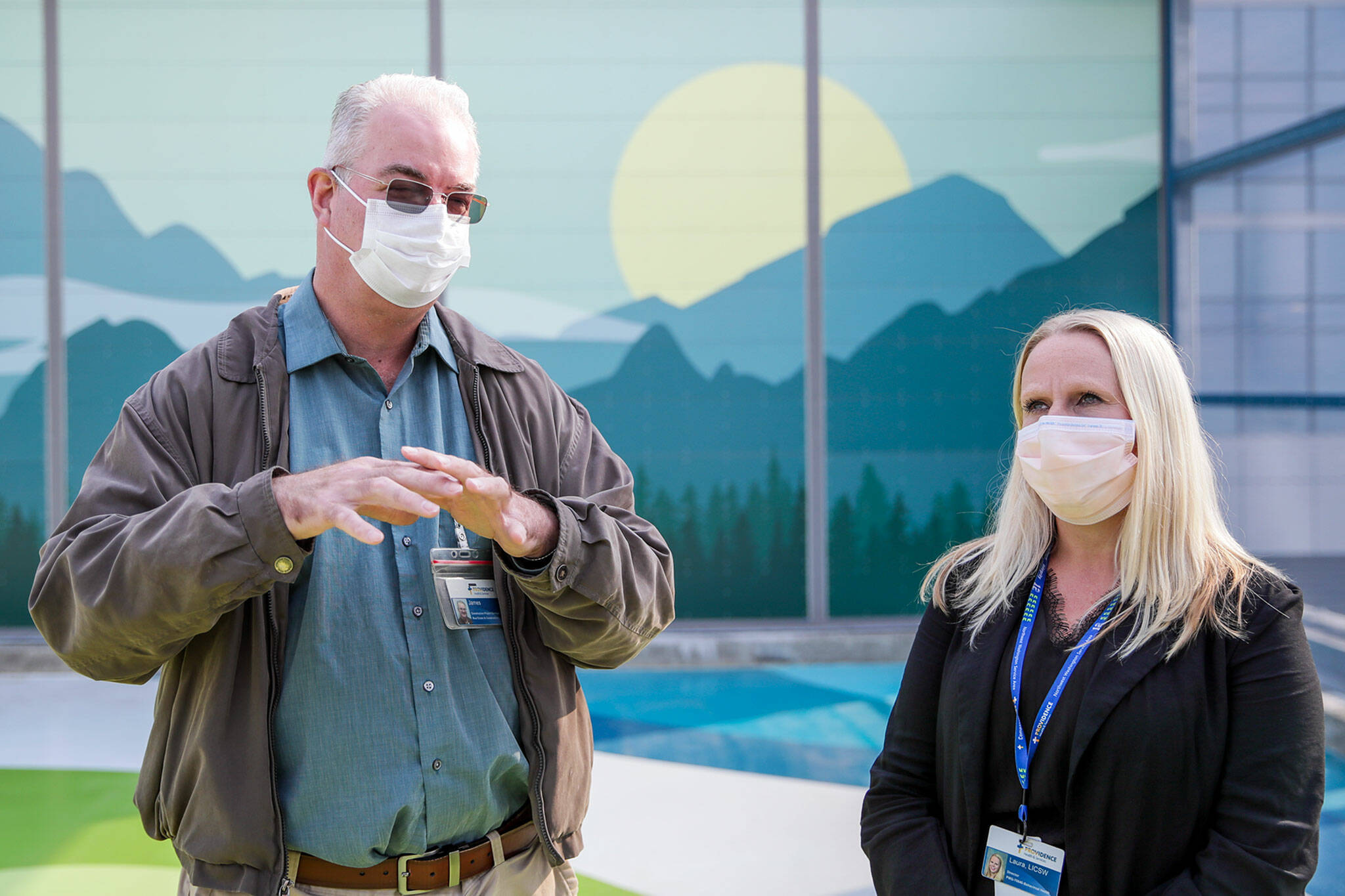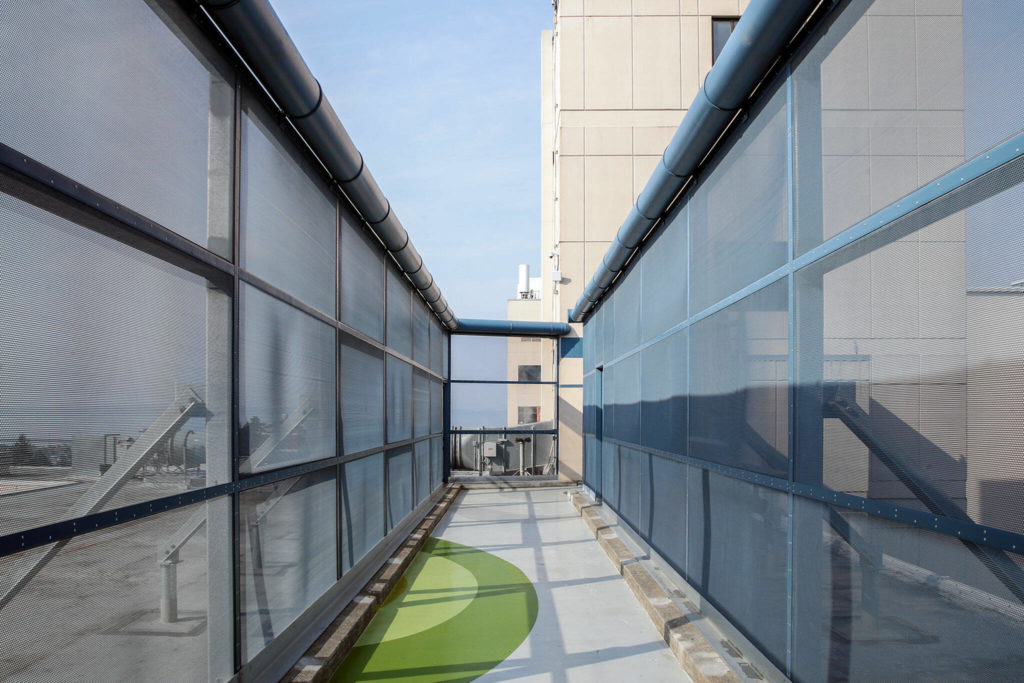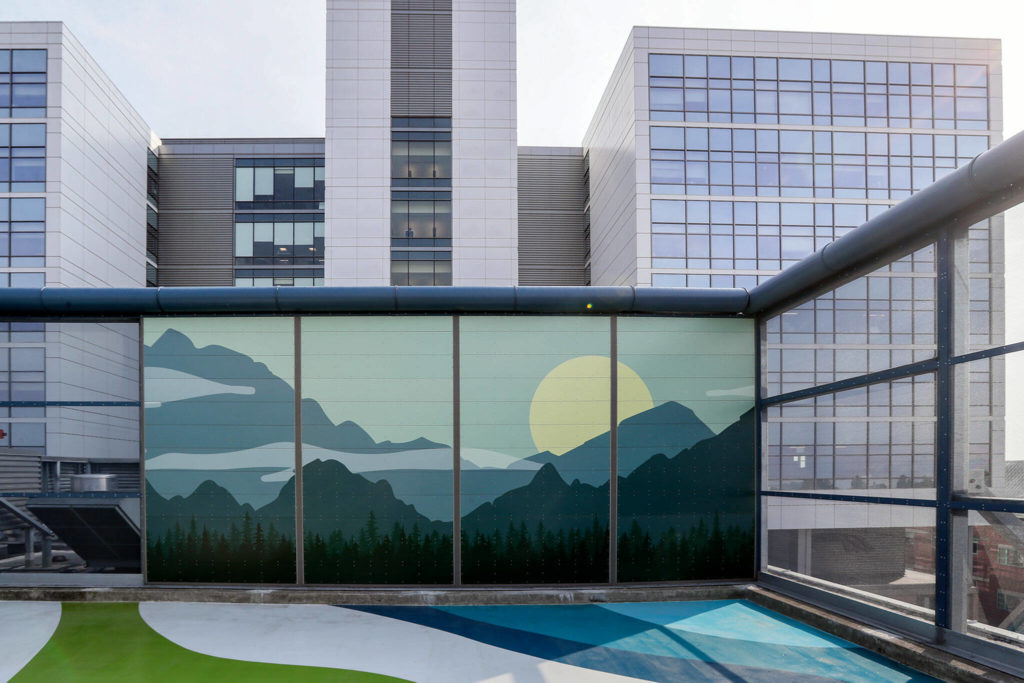EVERETT — Some residents of the inpatient behavioral health unit in the Colby campus of Providence Regional Medical Center Everett used to be stuck inside for weeks at a time.
That has changed, and doctors say it will help patients heal.
An old helicopter landing pad on the hospital’s rooftop has been converted into a 1,600-square-foot outdoor patio. Patients will soon have the ability to walk around and enjoy views of Possession Sound, the Olympic and Cascade ranges and the city of Everett. Known as the Lapis Rooftop Patio, it will also likely be used for group therapy sessions. The name was chosen because hues in the patio’s design were inspired by the deep blue color of the gemstone lapis lazuli.
“The whole concept of the patio is for patients to be able to get outside in nature, see the beautiful views and really have that therapeutic perspective out there,” said Laura Knapp, the hospital’s director of behavioral health.
Research shows getting outside can benefit one’s physical and psychological well-being.
Even in urban environments, a person can improve their mood by seeing the outdoors, according to an article published by the American Psychological Association. “The sense of connection you have with the natural world seems to contribute to happiness even when you’re not physically immersed in nature.”
But in behavioral health facilities, finding secure ways to provide patients access to the outside world is challenging.
The rooftop patio cost roughly $1 million and took several years to plan and construct. Throughout the process, Knapp said the first question people always asked was, “How do we make this safe?”
‘Both safe and therapeutic’
Last year, the hospital opened its 24-bed inpatient behavioral health unit on the fourth floor of Providence’s Colby campus.
“One of the reasons we opened our unit was that we had a lot of patients waiting in our hospital for psychiatric beds,” Knapp said. “That’s no surprise to anyone. It’s a long-standing community problem that we have — not enough beds in Snohomish County.”
Time in the unit varies widely for each patient. People typically stay one to two weeks. But a quarter of the beds are set aside for longer stays, such as patients who are under civil commitment for 90 to 180 days.
When the unit was constructed, Knapp said a plan for the rooftop patio was in the works.
“So you think about a patient being here for six months and not getting outside,” Knapp said. “Really, that’s the heart of this outdoor space: to ensure that people who do need those longer stays get outdoors.”
When health care workers and architects were searching for a viable outdoor space, the options were scarce. The hospital’s urban location limited possibilities.
“The hospital has been on this site since 1924, with this neighborhood around it,” said James Grafton, Providence’s design and construction manager. “We didn’t have any ability to push out into the neighborhood for something like this like a more suburban campus might be able to do.”
Designers selected the old helipad for the outdoor patio because it had been vacant ever since the hospital constructed a new landing pad. The open space was also on the same level as the behavioral health inpatient unit.
Building the patio was challenging.
“It’s a really unique facility. I don’t think there are many spaces like it in the United States,” Grafton said. “We had to sort of figure out how to do it on the fly — both the clinical staff and the construction side of it — to make a space that’s both safe and therapeutic.”
Grafton said the team had to take extra care to make it safe by psychiatric facility standards, “down to the last screw.” Hospital guidelines require patients who may experience ideations of self-harm or suicide be supervised and housed in ligature-resistant environments. The crew needed to balance making sure the space was secure without obstructing views.
“We were really trying to make it look like a patio, like a deck, like a recreational space, you know?” Grafton said. “We didn’t want it to look like something that was institutional or prison-like.”
‘A little fresh air’
The completed patio is open to the sky, enclosed by 12-foot blue fences that offer a panoramic view. On top of the fences are rolling cylinders designed to prevent scaling the enclosure. The hospital worked with Everett metal contractor Ricketts Metal to custom-design the patio. One of the patio walls features a mountain landscape mural by artists from Western Neon, a Seattle sign shop. The patio’s floor is painted with a rainbow of green, purple and blue.
Philanthropic donations funded all of the million-dollar patio project, including $100,000 from the hospital’s medical staff.
The biggest contribution was a $630,000 grant from the Raynier Institute, a Seattle-based foundation named after the late James Widener Ray.
Foundation vice president Ed Gardner described the patio project as a “home run” for the institute. Gardner said he was close friends with its namesake. Ray lived with bipolar disorder and struggled with his mental health most of his life. Gardner visited Ray many times when he was hospitalized due to mental health crises. At each visit, Ray always asked the same question: “Can I get outside for a little fresh air?”
Gardner said he was thrilled with how the patio turned out.
“To go to what it was, just an old flat roof of tar, to beautiful colors that were introduced in the mural,” he said. “The quality of the space is really important. This space is not only safe, but it’s beautiful.”
The Raynier Foundation was glad to contribute to a cause so close to the heart of Ray, and in the process, build a place dedicated to healing in Everett.
“A space like that attached to a hospital is going to be there for many, many, many decades,” Gardner said. “It’s a good feeling to know that’s going to be contributing to the well-being of folks even when you and I aren’t around anymore.”
Ellen Dennis: 425-339-3486; ellen.dennis@heraldnet.com; Twitter: @reporterellen.
Talk to us
> Give us your news tips.
> Send us a letter to the editor.
> More Herald contact information.



























